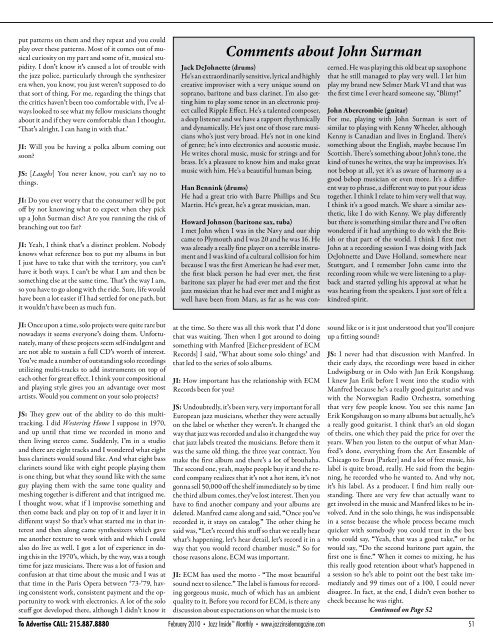February 2010 issue - Jazz Singers.com
February 2010 issue - Jazz Singers.com
February 2010 issue - Jazz Singers.com
You also want an ePaper? Increase the reach of your titles
YUMPU automatically turns print PDFs into web optimized ePapers that Google loves.
put patterns on them and they repeat and you could<br />
play over these patterns. Most of it <strong>com</strong>es out of musical<br />
curiosity on my part and some of it, musical stupidity.<br />
I don’t know it’s caused a lot of trouble with<br />
the jazz police, particularly through the synthesizer<br />
era when, you know, you just weren’t supposed to do<br />
that sort of thing. For me, regarding the things that<br />
the critics haven’t been too <strong>com</strong>fortable with, I’ve always<br />
looked to see what my fellow musicians thought<br />
about it and if they were <strong>com</strong>fortable than I thought,<br />
‘That’s alright, I can hang in with that.’<br />
JI: Will you be having a polka album <strong>com</strong>ing out<br />
soon?<br />
JS: [Laughs] You never know, you can’t say no to<br />
things.<br />
JI: Do you ever worry that the consumer will be put<br />
off by not knowing what to expect when they pick<br />
up a John Surman disc? Are you running the risk of<br />
branching out too far?<br />
JI: Yeah, I think that’s a distinct problem. Nobody<br />
knows what reference box to put my albums in but<br />
I just have to take that with the territory, you can’t<br />
have it both ways. I can’t be what I am and then be<br />
something else at the same time. That’s the way I am,<br />
so you have to go along with the ride. Sure, life would<br />
have been a lot easier if I had settled for one path, but<br />
it wouldn’t have been as much fun.<br />
JI: Once upon a time, solo projects were quite rare but<br />
nowadays it seems everyone’s doing them. Unfortunately,<br />
many of these projects seem self-indulgent and<br />
are not able to sustain a full CD’s worth of interest.<br />
You’ve made a number of outstanding solo recordings<br />
utilizing multi-tracks to add instruments on top of<br />
each other for great effect. I think your <strong>com</strong>positional<br />
and playing style gives you an advantage over most<br />
artists. Would you <strong>com</strong>ment on your solo projects?<br />
JS: They grew out of the ability to do this multitracking.<br />
I did Westering Home I suppose in 1970,<br />
and up until that time we recorded in mono and<br />
then living stereo came. Suddenly, I’m in a studio<br />
and there are eight tracks and I wondered what eight<br />
bass clarinets would sound like. And what eight bass<br />
clarinets sound like with eight people playing them<br />
is one thing, but what they sound like with the same<br />
guy playing them with the same tone quality and<br />
meshing together is different and that intrigued me.<br />
I thought wow, what if I improvise something and<br />
then <strong>com</strong>e back and play on top of it and layer it in<br />
different ways? So that’s what started me in that interest<br />
and then along came synthesizers which gave<br />
me another texture to work with and which I could<br />
also do live as well. I got a lot of experience in doing<br />
this in the 1970’s, which, by the way, was a tough<br />
time for jazz musicians. There was a lot of fusion and<br />
confusion at that time about the music and I was at<br />
that time in the Paris Opera between ‘73-’79, having<br />
consistent work, consistent payment and the opportunity<br />
to work with electronics. A lot of the solo<br />
stuff got developed there, although I didn’t know it<br />
Comments about John Surman<br />
Jack DeJohnette (drums)<br />
He’s an extraordinarily sensitive, lyrical and highly<br />
creative improviser with a very unique sound on<br />
soprano, baritone and bass clarinet. I’m also getting<br />
him to play some tenor in an electronic project<br />
called Ripple Effect. He’s a talented <strong>com</strong>poser,<br />
a deep listener and we have a rapport rhythmically<br />
and dynamically. He’s just one of those rare musicians<br />
who’s just very broad. He’s not in one kind<br />
of genre; he’s into electronics and acoustic music.<br />
He writes choral music, music for strings and for<br />
brass. It’s a pleasure to know him and make great<br />
music with him. He’s a beautiful human being.<br />
Han Bennink (drums)<br />
He had a great trio with Barre Phillips and Stu<br />
Martin. He’s great, he’s a great musician, man.<br />
Howard Johnson (baritone sax, tuba)<br />
I met John when I was in the Navy and our ship<br />
came to Plymouth and I was 20 and he was 16. He<br />
was already a really fine player on a terrible instrument<br />
and I was kind of a cultural collision for him<br />
because I was the first American he had ever met,<br />
the first black person he had ever met, the first<br />
baritone sax player he had ever met and the first<br />
jazz musician that he had ever met and I might as<br />
well have been from Mars, as far as he was con-<br />
at the time. So there was all this work that I’d done<br />
that was waiting. Then when I got around to doing<br />
something with Manfred [Eicher-president of ECM<br />
Records] I said, ‘What about some solo things’ and<br />
that led to the series of solo albums.<br />
JI: How important has the relationship with ECM<br />
Records been for you?<br />
JS: Undoubtedly, it’s been very, very important for all<br />
European jazz musicians, whether they were actually<br />
on the label or whether they weren’t. It changed the<br />
way that jazz was recorded and also it changed the way<br />
that jazz labels treated the musicians. Before them it<br />
was the same old thing, the three year contract. You<br />
make the first album and there’s a lot of brouhaha.<br />
The second one, yeah, maybe people buy it and the record<br />
<strong>com</strong>pany realizes that it’s not a hot item, it’s not<br />
gonna sell 50,000 off the shelf immediately so by time<br />
the third album <strong>com</strong>es, they’ve lost interest. Then you<br />
have to find another <strong>com</strong>pany and your albums are<br />
deleted. Manfred came along and said, “Once you’ve<br />
recorded it, it stays on catalog.” The other thing he<br />
said was, “Let’s record this stuff so that we really hear<br />
what’s happening, let’s hear detail, let’s record it in a<br />
way that you would record chamber music.” So for<br />
those reasons alone, ECM was important.<br />
JI: ECM has used the motto - “The most beautiful<br />
sound next to silence.” The label is famous for recording<br />
gorgeous music, much of which has an ambient<br />
quality to it. Before you record for ECM, is there any<br />
discussion about expectations on what the music is to<br />
cerned. He was playing this old beat up saxophone<br />
that he still managed to play very well. I let him<br />
play my brand new Selmer Mark VI and that was<br />
the first time I ever heard someone say, “Blimy!”<br />
John Abercrombie (guitar)<br />
For me, playing with John Surman is sort of<br />
similar to playing with Kenny Wheeler, although<br />
Kenny is Canadian and lives in England. There’s<br />
something about the English, maybe because I’m<br />
Scottish. There’s something about John’s tone, the<br />
kind of tunes he writes, the way he improvises. It’s<br />
not bebop at all, yet it’s as aware of harmony as a<br />
good bebop musician or even more. It’s a different<br />
way to phrase, a different way to put your ideas<br />
together. I think I relate to him very well that way.<br />
I think it’s a good match. We share a similar aesthetic,<br />
like I do with Kenny. We play differently<br />
but there is something similar there and I’ve often<br />
wondered if it had anything to do with the British<br />
or that part of the world. I think I first met<br />
John at a recording session I was doing with Jack<br />
DeJohnette and Dave Holland, somewhere near<br />
Stuttgart, and I remember John came into the<br />
recording room while we were listening to a playback<br />
and started yelling his approval at what he<br />
was hearing from the speakers. I just sort of felt a<br />
kindred spirit.<br />
sound like or is it just understood that you’ll conjure<br />
up a fitting sound?<br />
JS: I never had that discussion with Manfred. In<br />
their early days, the recordings were based in either<br />
Ludwigsburg or in Oslo with Jan Erik Kongshaug.<br />
I knew Jan Erik before I went into the studio with<br />
Manfred because he’s a really good guitarist and was<br />
with the Norwegian Radio Orchestra, something<br />
that very few people know. You see this name Jan<br />
Erik Kongshaug on so many albums but actually, he’s<br />
a really good guitarist. I think that’s an old slogan<br />
of theirs, one which they paid the price for over the<br />
years. When you listen to the output of what Manfred’s<br />
done, everything from the Art Ensemble of<br />
Chicago to Evan [Parker] and a lot of free music, his<br />
label is quite broad, really. He said from the beginning,<br />
he recorded who he wanted to. And why not,<br />
it’s his label. As a producer, I find him really outstanding.<br />
There are very few that actually want to<br />
get involved in the music and Manfred likes to be involved.<br />
And in the solo things, he was indispensable<br />
in a sense because the whole process became much<br />
quicker with somebody you could trust in the box<br />
who could say, “Yeah, that was a good take,” or he<br />
would say, “Do the second baritone part again, the<br />
first one is fine.” When it <strong>com</strong>es to mixing, he has<br />
this really good retention about what’s happened in<br />
a session so he’s able to point out the best take immediately<br />
and 99 times out of a 100, I could never<br />
disagree. In fact, at the end, I didn’t even bother to<br />
check because he was right.<br />
Continued on Page 52<br />
To Advertise CALL: 215.887.8880 <strong>February</strong> <strong>2010</strong> • <strong>Jazz</strong> Inside Monthly • www.jazzinsidemagazine.<strong>com</strong> 51




